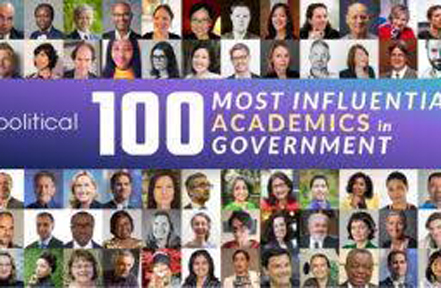
NirpalShergill
LONDON (TIP): As many as eight Indian American academics, including IMF’s Gita Gopniath figure in London based Apolitical’s latest list of 100 Most Influential Academics in Government whose work influenced policymaking in five key areas. This year’s list recognizes academics working in five timely policy areas that represent problems being faced by government everywhere, and present an opportunity for intergovernmental collaboration, it said. They are: Recovery from Covid-19; Employment and skills social policy, Climate and sustainability and Policymaking processes and approaches.
Gopinath, the First Deputy Managing Director of the International Monetary Fund, its number-two leadership position, since Jan 21, has been recognized in the area of Economics, employment & skills.
Karthik Muralidharan, Tata Chancellor’s Professor of Economics at the University of California, San Diego (UCSD) and Rohini Pande, the Henry J. Heinz II Professor of Economics and Director of the Economic Growth Center, Yale University too have been selected in the same category.
Nitin Nohria, Dean of Harvard Business School, has been recognized for his work in other policy areas along with Devesh Kapur, Starr Foundation Professor of South Asian Studies and Pradeep Khosla, Eighth Chancellor, University of California San Diego.
Anup Malani, Lee and Brena Freeman Professor at the University of Chicago Law School, and Manoj Mohanan, Associate Professor at Duke University’s Sanford School of Public Policy, have been chosen in Recovery from Covid-19 category.
The John Zwaanstra Professor of International Studies and of Economics at Harvard University, Gopinath is currently on leave of public service from the economics department. She served as the IMF Chief Economist of the International Monetary Fund (IMF) from 1919 to 2022. Gopinath’s research focuses on International Finance and Macroeconomics. She is currently a member of the Group of Thirty and the Council on Foreign Relations.
Earlier she was a member of the economic advisory panel of the Federal Reserve Bank of New York, a visiting scholar at the Federal Reserve Bank of Boston, Economic Adviser to the Chief Minister of Kerala state in India, and member of the Eminent Persons Advisory Group on G-20 Matters for India’s Ministry of Finance.
Before coming to Harvard, she was an assistant professor of economics at the University of Chicago’s Booth School of Business. She received her PhD in economics from Princeton University, after earning a BA from Lady Sri Ram College, and MA degrees from the Delhi School of Economics and the University of Washington.
Nohria’s intellectual interests center on human motivation, leadership, corporate transformation and accountability, and sustainable economic and human performance. He is co-author or co-editor of 16 books as also author of over 50 journal articles, book chapters, cases, working papers, and notes.
Prior to joining the Harvard Business School faculty in July 1988, Nohria received his PhD in Management from the Sloan School of Management, Massachusetts Institute of Technology.
He is a BTech in Chemical Engineering from the Indian Institute of Technology, Bombay (which honored him as a Distinguished Alumnus in 2007). He was a visiting faculty member at the London Business School in 1996.
Anup Malani is an elected member of the American Academy of Arts & Sciences. He conducts research in development economics, health economics and law and economics. During the Covid pandemic, Malani led a modeling team that developed a forecasting model and method of adaptive control for Covid in India; that model was used to inform policy in Bihar and in Indonesia.
Malani was an investigator on population-level viral surveys in Bihar, serological (antibody) surveys in Mumbai, Karnataka, and Tamil Nadu, and a cellular immunity survey in Bangalore.
This work on Covid has won two Emergent Ventures prizes. He worked on vaccine distribution policies for Indonesia and India. He also used a large, panel survey to estimate the number of excess deaths in India during the pandemic and to understand the economic impacts of the pandemic.
He is now conducting verbal autopsies on roughly 30,000 to determine the fraction of excess deaths that are attributable to Covid. Finally, Malani has studied how Indian households adapted financially to Covid and the impact of Covid on individual income inequality in India. Prior to the pandemic, Malani’s research focused on development economics. He is the co-founder and Faculty Director of the International Innovation Corps, a social service program that sends postgraduates to work on innovative projects with government officials in India and the US.
Malani has a JD and PhD in economics from the University of Chicago. He was a law clerk to Justice Sandra Day O’Connor on the U.S. Supreme Court and the founding Faculty Director of the Tata Centre for Development at the University of Chicago.
Manoj Mohanan’s research focuses primarily on the economics of health and development, and health policy. His past research has examined topics including performance incentive contracts, public private partnerships, quality of care, social franchising, accountability interventions, and household health behavior across multiple countries.
His research also contributed to early evidence on Covid from seroprevalence studies in India. His ongoing research aims to understand long term consequences of large-scale disruptions caused by the pandemic and its effect on vulnerability of households.
Mohanan was trained as a health economist at Harvard University’s Inter-Faculty PhD Program in Health Policy (Economics), and also holds additional degrees in public health and medicine.
Born and raised in India, Prof. Muralidharan earned a bachelor’s degree in economics from Harvard University (summa cum laude), an MPhil in economics from Cambridge University (ranked first), and a PhD in economics from Harvard University.
His research spans development, public, and labor economics with a focus on improving the effectiveness of public spending in the social sector (education, health, and social protection programs).
His research program is characterized by large-scale randomized experiments conducted in partnership with governments to study the impact of programs and policies at scale.
A Fellow and Board Member of the Bureau of Economic Analysis of Development (BREAD), he is actively involved in policy advising and capacity building in India at both the central and state government level.
A co-editor of American Economic Review: Insights, Rohini Pande’s research is largely focused on how formal and informal institutions shape power relationships and patterns of economic and political advantage in society, particularly in developing countries.
She is interested the role of public policy in providing the poor and disadvantaged political and economic power, and how notions of economic justice and human rights can help justify and enable such change.
Her most recent work focuses on testing innovative ways to make the state more accountable to its citizens, such as strengthening women’s economic and political opportunities, ensuring that environmental regulations reduce harmful emissions, and providing citizens effective means to voice their demand for state services.
In 2018, Pande received the Carolyn Bell Shaw Award from the American Economic Association for promoting the success of women in the economics profession.
Before coming to Yale, Pande was the Rafik Harriri Professor of International Political Economy at Harvard Kennedy School, where she co-founded Evidence for Policy Design.
Pande received a PhD in economics from London School of Economics, a BA/MA in Philosophy, Politics and Economics from Oxford University and a BA in Economics from Delhi University.
Devesh Kapur joined the Johns Hopkins University School of Advanced International Studies (SAIS) in July 2018 from the University of Pennsylvania
There, he was a professor of Political Science and Director of the Center for the Advanced Study of India, holding the Madan Lal Sobti Chair for the Study of Contemporary India.
Prior to his tenure at Penn, he was Associate Professor of Government at the University of Texas at Austin, and the Frederick Danziger Associate Professor of Government at Harvard.
Kapur received the Joseph R. Levenson Teaching Prize, awarded to the best junior faculty at Harvard College and Outstanding Teaching in Political Science by the American Political Science Association, in 2005.
Kapur’s research has focused on five broad areas that examine the political and institutional determinants of economic development: international financial institutions; political and economic consequences of international and internal migration; the effects of market forces and urbanization on the well-being of socially marginalized groups in India; governance and public institutions; and higher education.
Kapur has a BTech in Chemical Engineering from IIT (BHU) Varanasi; MS in Chemical Engineering from the University of Minnesota; PhD from the Woodrow Wilson School at Princeton.
Pradeep Khosla’s research interests encompass the areas of internet-enabled collaborative design, collaborating autonomous systems, agent-based architectures for distributed design and embedded control, software composition and reconfigurable software for real-time embedded systems, reconfigurable and distributed robotic systems, integrated design-assembly planning systems and distributed information systems.
His research has resulted in three books and more than 350 journal articles and conference and book contributions. He is also the founding director of the Carnegie Mellon CyLab and the Institute for Complex Engineered Systems, which pursues interdisciplinary projects.
Khosla is an elected member of the American Academy of Arts and Sciences, National Academy of Engineering (NAE) and the American Society for Engineering Education (ASEE).
He is a Fellow of the Institute of Electrical and Electronics Engineers (IEEE), the American Society of Mechanical Engineers (ASME), the American Association for Advancement of Science (AAAS), the American Association of Artificial Intelligence (AAAI) and the Indian Academy of Engineering.
He is an Honorary Fellow of the Indian Academy of Science. His other awards include the 2012 Light of India Award, a Lifetime Achievement Award from the American Society of Mechanical Engineers, and the W. Wallace McDowell Award from the Institute of Electrical and Electronics Engineers Computer Society.
In 2012, he was named as one of the 50 most influential Indian-Americans by SiliconIndia.





Be the first to comment